
The Pterophoridae or plume moths are a family of Lepidoptera with unusually modified wings, giving them the shape of a narrow winged airplane. Though they belong to the Apoditrysia like the larger moths and the butterflies, unlike these they are tiny and were formerly included among the assemblage called "microlepidoptera".
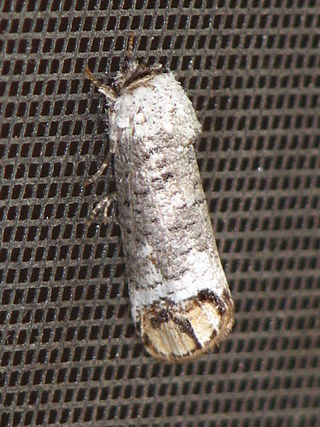
The Cossidae, the cossid millers or carpenter millers, make up a family of mostly large miller moths. This family contains over 110 genera with almost 700 known species, and many more species await description. Carpenter millers are nocturnal Lepidoptera found worldwide, except the Southeast Asian subfamily Ratardinae, which is mostly active during the day.
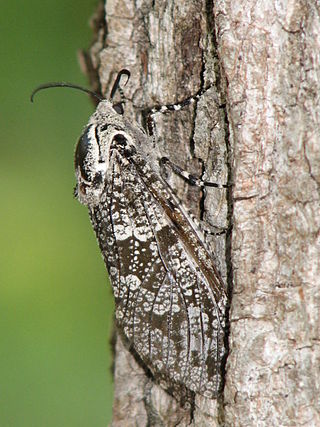
The Cossinae are the nominate subfamily of the Cossidae. The caterpillars of several Cossinae species, such as the carpenterworm and the goat moth, are significant pests. On the other hand, in Chile the caterpillars of the Chilean moth are collected on a commercial scale for sale as fishing bait and terrarium pet food; they are usually called "butterworms" in international trade.

Acossus centerensis, the poplar carpenterworm, is a moth of the family Cossidae. It is found in North America from New Jersey west to Illinois and North Dakota. In Canada it is found from Quebec and Ontario west to British Columbia.
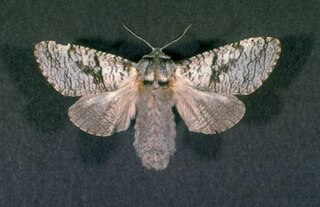
Acossus populi, the aspen carpenterworm, is a moth of the family Cossidae. It is found in the United States in Nevada, Colorado, California and in the northern Rocky Mountains. In Canada it is found in Ontario and British Columbia.

Prionoxystus robiniae, the carpenterworm moth or locust borer, is a moth of the family Cossidae. It was first described by Peck in 1818 and it is found in southern Canada and most of the United States.
Lioptilodes albistriolatus is a moth of the family Pterophoridae. In South America and Central America it has been recorded from Argentina, Brazil, Chile, Costa Rica, Cuba, Ecuador, Guatemala, Paraguay, Peru and Puerto Rico. It is also present in North America, where it is known from Mexico, California, Texas, New Mexico and Arizona. It is an introduced species in Hawaii.
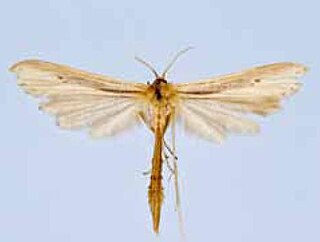
Hellinsia balanotes, the baccharis borer, is a moth of the family Pterophoridae which is native to Guatemala, northern Mexico, and the United States including Arizona, Texas, Florida, Mississippi, South Carolina and Maryland, but has been introduced to Australia for the control of Baccharis halimifolia. The species was first described by Edward Meyrick in 1908.

Acossus is a genus of moths belonging to the family Cossidae.

Cisthene tenuifascia, the thin-banded lichen moth or three-banded lichen moth, is a moth of the family Erebidae. It was described by Leon F. Harvey in 1875. It is found in Mexico and from Arizona to Florida, North Carolina and Oklahoma. Strays can be found further north.
Comadia is a genus of moths in the family Cossidae first described by William Barnes and James Halliday McDunnough in 1911.
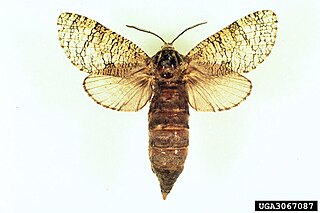
Prionoxystus is a genus of moths in the family Cossidae.
Inguromorpha basalis, the black-lined carpenterworm moth, is a moth in the family Cossidae. It is found in North America, where it has been recorded from the south-eastern United States, from New Jersey south to Florida and west to Missouri and Arkansas.

Givira lotta, the pine carpenterworm moth, is a moth in the family Cossidae. The species was first described by William Barnes and James Halliday McDunnough in 1910. It is found in the United States, where it has been recorded from California, Arizona, New Mexico and Colorado. The habitat consists of pine forests.

Givira anna, the anna carpenterworm moth, is a moth in the family Cossidae. It is found in North America, where it has been recorded from Alabama, Arkansas, Florida, Georgia, Indiana, Kansas, Kentucky, Louisiana, Maryland, Mississippi, North Carolina, Oklahoma, South Carolina, Tennessee and Texas.

The Zeuzerinae are a subfamily of the family Cossidae.
Psychonoctua personalis is a moth in the family Cossidae. It was described by Augustus Radcliffe Grote in 1865. It is found on Cuba, Jamaica, Hispaniola and Puerto Rico.

Hileithia differentialis is a species of moth in the family Crambidae. It was described by Harrison Gray Dyar Jr. in 1914. It is found in the US states of Florida and Texas and from the West Indies to Central America.
Baccharis dioica is a North American species of shrubs in the family Asteraceae known by the common name broombush falsewillow. It is native to Florida, the Yucatán Peninsula, and the West Indies.











